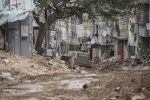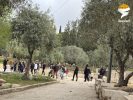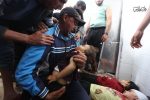The video footage of 15-year-old Tariq Abu Khdeir apparently being beaten up by Israeli soldiers is another lamentable chapter adding to the volcanic torrents of anger that has flooded Israel and Palestine over the last few weeks.
Talk of a third Intifada is gaining ground. Israelis are naturally shocked at the kidnapping and murder of three Israeli teenagers whilst Palestinians are no less furious at the killing of their children and human rights abuses against them including mass detentions land confiscations and home demolitions. This has culminated with the death of 16-year-old Mohammad Abu Khdeir from Jerusalem allegedly lynched and his body burnt. Israeli far right protesters had on 1 July roared anti-Arab slogans including ‘death to Arabs’ in Jerusalem. Hate attacks are flaring up with increasing regularity.
All this has put into sharp focus the topic of grassroots Jewish-Palestinian relations and in particular the issue of incitement.
Hitherto the debate about incitement has been largely one-way traffic. You could pick any one of hundreds of prominent Israeli ministerial statements. Israeli Prime Minister Benjamin Netanyahu proclaimed “True peace cannot exist without stopping the incitement against Israel and educating for peace.” No surprise that this is echoed in American Presidential statements and for example in British Prime Minister David Cameron’s speech to the Knesset this March.
That the day-to-day anger against the 47-year-old occupation leads to unsavoury racist Palestinian comment against Israelis and Jews is not justified but also perhaps not a shock. Unquestionably the Palestinian Authority has not addressed the issue. Descriptions of Jews as ‘apes and pigs’ and other offensive fare must end. Hamas media is even worse.
Yet it is almost impossible to find a murmur of international diplomatic criticism for the similarly dangerous and significant racist discourse in Israel against Palestinians and Arabs that has been prevalent for decades not just days.
“Gas the Arabs” screams a piece of settler graffiti in the centre of Hebron just a handful of miles from where the three Israeli kids were found. For good measure it is next to a Palestinian school. This is but one of several bits of genocidal graffiti daubed on the walls of area H2 the part of this ancient city under full Israeli control. To the east in the settlement of Kiryat Arba the memorial to Baruch Goldstein is still tended and revered. Goldstein was a doctor from the settlement who entered into the Ibrahimi mosque and massacred 29 Palestinian Muslims at prayer in 1994.
Settler violence is a continual threat to Palestinian life. One element is the so-called price-tag attacks acts of violence against Palestinian targets or Israeli military in retaliation for any attempt to limit their settlement enterprise. For example a major wave of settler attacks on Palestinians followed the removal of settlement outposts near Nablus in April.
Racist incitement is not new especially amongst the more extreme settlers but it also worryingly passes the lips of those at the top of the Israeli leadership. Israeli Prime Minister Menachem Begin in addressing the Knesset in June 1982 ranted that the Palestinian “are beasts walking on two legs.” Another prime minister Yitzhak Shamir was no more charming when he stated in a 1981 speech to Israeli settlers that “[The Palestinians] would be crushed like grasshoppers … heads smashed against the boulders and walls.”
And Netanyahu himself is no angel. As Israeli Deputy Foreign Minister he told students at Bar Ilan University in 1989: “Israel should have exploited the repression of the demonstrations in China when world attention focused on that country to carry out mass expulsions among the Arabs of the territories.”
Palestinians have been compared to many varieties of animals. Ehud Barak compared them to crocodiles Raphael Eitan former chief of staff the late Rabbi Ovadia Yusef called them “snakes” and Netanyahu “wild beasts.”
The most troubling aspect is that there is so little accountability when Israeli soldiers and settlers have killed or injured Palestinians. In the case of Israeli settler attacks on Palestinians according to the Israeli human rights organisation B’tselem “The undeclared policy of the Israeli authorities in response to these attacks is lenient and conciliatory. Perpetrators are rarely tried and many cases are not investigated at all or are closed with no operative conclusions.” As an occupying power Israel is legally obliged to protect the Palestinian population yet according to the Israeli group Yesh Din 91percent of all cases brought by Palestinians against settlers are closed without indictment.
This is the backdrop the Israeli reactions to the kidnappings and murderers. In the timeframe between finding the bodies of the kidnapped Israeli teenagers and the killing of Muhammad Abu Khdeir there was a free-for-all against Palestinians. It engendered a vitriolic debate about how to make Hamas pay and a fulsome determination to hold them accountable. Palestinian President Mahmoud Abbas ascended to a new specially designated status of ‘mega-terrorist’ according to Israeli Economy Minister Naftali Bennett. A little late in the day after Mohammad’s body was found politicians called for calm including President Shimon Peres.
Yet against all this never forget that the most dangerous incitement stems from the occupation and violence a permanent feature of Palestinian lives a permanent provocation. The daily humiliation of checkpoints the home demolitions the use of live fire the arrests without trial or proper judicial process the blockade of Gaza are the most dangerous accelerants of violence. None of this will improve as Israel pushes ever more thousands of settlers into occupied Palestinian territory.
This state of affairs was summed up in a prescient warning by none other than Yuval Diskin the former head of Shin Bet: “The illusion that ‘price tag’ attacks are just a few slogans on the walls and not really racism; the illusion that everything can be solved with a little more force; the illusion that the Palestinians will just accept all that we are doing in the West Bank and not respond despite their rage frustration and worsening economic situation.”
Out of this hate-surge there are opportunities. Too many have been silent about the rise in bigotry. The stark downwards turn in relations must inspire them to speak up. Israel must release itself from the grip of the extreme settler lobby. Palestinians must be treated as a people with rights and freedoms to be respected. It is the time for a dormant Israeli peace camp to rise up to the challenge before too late before the country is overwhelmed and ripped apart from within.
– Chris Doyle is the director of CAABU (Council for Arab-British Understanding). As the lead spokesperson for CAABU and as an acknowledged expert on the region Chris is a frequent commentator on TV and Radio and gives numerous talks around the country on issues such as the Arab Spring Libya Syria Palestine Iraq Islamophobia and the Arabs in Britain. He has had numerous articles published in the British and international media. He has organized and accompanied numerous British Parliamentary delegations to Arab countries.
The views expressed in this article belong to the author and do not necessarily reflect the editorial policy of Middle East Eye.
Photo credit: An Israeli policeman walks past graffiti on the wall of a church (AFP)











